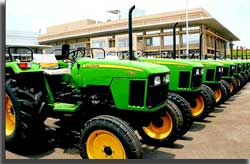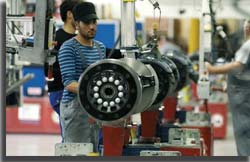| Size of the Industry | Tractor market in India is about Rs 6000 crore. On an average around 400000 tractors are produced and their sale is 260000 |
| Geographical distribution | The tractor markets of Karnataka, Maharashtra, Tamil Nadu, and Gujarat are growing ~ 50%. |
| Output per annum | Domestic sales - 350,000 units p.a. and Exports - 60,000 units p.a |
| Percentage in world market | About 20% of world tractor production is carried out in India |
| Market Capitalization | CAGR in volumes @ 10 % over past four decades with seasonal variations. |

Credit facilities for farmers continued to improve and the tractor market expanded rapidly with the total in use passing the half million mark by 1980. 1981 to 1990 A further five (Auto Tractors, Haryana Tractors, United Auto Tractors, Asian Tractors, VST Tillers) manufacturers began production during this period but only last one survived in the increasingly competitive market place. Annual production exceeded 75000 units by 1985 and reached 140000 in 1990 when the total in use was about 1.2 million. Then India - a net importer up to the mid-seventies - became an exporter in the 80's mainly to countries in Africa between 1991 to 1997.
Since 1992 it has not been necessary to obtain an industrial license for tractor manufacture in India. By 1997 annual production exceeded 255000 units and the national tractor park had passed the two million mark. India has now emerged as one of the world leaders in wheeled tractor production. Saturation achieved in Punjab with tractor density as high as 82 per 1000 ha against Indian average of 12.4, world average of 17.4 and 32.1 in developed countries. Intense competition has led to rapid advances in design and quality.
In 1961 since tractor manufacturing in India started, the industry has grown at a phenomenal pace in the last five decades to achieve a record production of over three lakh units per year.
In Farm Mechanization there are two major contribution one higher productivity and greater output. Tractors form an integral part of the farm mechanization and have a crucial role to play in increasing agricultural productivity. Tractor is a highly versatile piece of machinery having a multitude of uses, used in agriculture both for land reclamation and for carrying out various crop cultivation and also employed for carrying out various operations connected with raising the crops by attaching suitable implements and to provide the necessary energy for performing various crop production operations involved in the production of agricultural crops specially in India where the major occupation is Agricultrue.

Indian Tractor Industry, comparatively young by world standards has expanded at a spectacular pace during the last four decades. Consequently it now occupies a place of pride in India's Automobile Industry also. U.S.A., U.S.S.R. and only a few Western European countries exceed the current production of tractors.
India's growth is unmatched even with countries of long history of Tractor manufacturing. The Indian Tractor Industry's spectacular achievement reflects the maturity and dynamism of tractor manufacturers and the various policies adopted by the government to enable it to effectively meet the demand. It is a typical industry where both imported technology and indigenous developed technology have developed towards meeting the overall national requirements of the country. As per the global spotlight on tractors manufacturers in terms of volume seems to be swinging away from the USA, UK and Western and Eastern Europe towards India where growth in the number of producers and the total volume in recent years have been impressive. In India, Tractor Industry has played a vital role in the development.
Today India's gross cropped area is next only to United States of America and Russia and along with fragmented land holdings which has helped the country to become the largest Tractor Market in the world. But it drops to eight position in terms of total Tractor in use in the country when compared to international figures, only 3% of total tractors used all over the world . It is to be noted that while the overall automobile industry is facing recession the tractor industry is growing at 9%. About 20% of world tractor production is carried out in our country only. The arable land in India is high as 12% of the total arable land in the world. Indian tractor market has to be viewed considering its position in the world with respect to key parameters as given below:
According to a study conducted by PHD Chamber of Commerce and Industry, since purchase of tractor involves a big investment its demand is affected by the availability and easiness of credit. A higher availability of credit will lead to a higher demand for tractors. The tractors between the 31-40 horse power and 31-40 hp range dominate the market .The reason for medium horse power tractors being more popular are that the major tractor demanding states like Punjab, Haryana and Uttar Pradesh have plenty of alluvial soil which does not require deep tilling. Lately it is visualised that higher hp segment has the maximum growth potential. Higher horse powered tractors will be the future requirement with the government intention to encourage contract farming through the leasing in and leasing out of farm lands.

Uttar Pradesh is the largest tractor market in our country. One out of every four tractor is being purchased here.
One third of world's Tractor production is in India. The Total Turn Over is 10000 crore and the Total investment is 8000 crore. With Employment of 28000 people directly and 150000 people indirectly the Tractor population is 3000000 compared to 900000 in China.
|
MANUFACTURER
|
COLLABORATOR |
YEAR |
|
Eicher Tractors Ltd
|
Gebr, Eicher Tractor. West Germany |
1961 |
|
Gujarat Tractors Ltd
|
Motokov Praha. Czechoslovakia |
1963 |
|
TAFE
|
Messey Ferguson. UK |
1961 |
|
Escorts Ltd
|
Moloimport Arazawa Zaklady Mechaniczne .Ursus Poland |
1964 |
|
Mahindra And Mahindra
|
International Harvestor. UK |
1965 |
|
+Escorts Tractor Ltd
|
Ford .U.K. |
1971 |
|
Hindustan Machine Tools
|
Motokov Praha. Czechoslovakia |
1971 |
|
Kirloskar Tractors Lmt
|
Klochner Humboldt Deutz. Germany |
1974 |
|
Punjab Tractor Limited
|
CMERI.INDIA |
1974 |
|
Pittie Tractor Limited
|
Own know how |
1974 |
|
Harsha Tractor Ltd
|
Moto Import. Russia |
1975 |
|
*Auto Tractor Ltd
|
British Leyland. U.K. |
1981 |
|
Pratap Steel Rolling Mill
|
Own knowhow |
1983 |
|
Vst Tillers
|
Mitsubishi. Japan |
1983 |
|
United Auto Tractor Ltd
|
Uzina Tractorul. Romania |
1986 |
|
Asian Tractor Ltd
|
Own know how |
1989 |
|
Bajaj Tempo Ltd
|
Own know how |
1987 |
|
International Tractors
|
Own know how |
1998 |
|
Larsen And Tourbo Ltd
|
John Deere. USA |
1999 |
|
New Holland Tractor
|
New Holland Tractors .Italy |
1999 |
|
Greaves Ltd
|
Same Deutz Fahr. Italy |
1999 |
- Today in India there is an increase in awareness among the farmers for the need of farm mechanization and are keen to acquire tractor with the help of credit facilities from financial institutions.
- Agronomists believe that there is need for more tilling due to depletion of moisture and repeated cultivation of land .It is precisely for this reason that the demand for tractors was well maintained even during a drought period.
- Cost of tractors in India is the cheapest in world .The cost of a finished tractor here is as much as the cost of gear box in developed countries. Hence there exists tremendous scope for exports.
- Animal power available is too inadequate to meet power demand of our farmers. Mechanized operations are preferred to eliminate drudgery and delay, also labour shortage during harvesting increased the use of tractor.
- More farmers are opting for multiple cropping over last decade. Country's net cropped area had remain virtually stagnant while gross cropped area increased by about 4.7%. This indicate the increased popularity of multiple cropping
- 95% of tractor sales are on credit. Credit is extended by commercial banks, state land development banks and regional rural banks.
- Irrigation facilities reduce reliance on the monsoon and allow for quick yielding varieties of food grain .This reduces the cropping cycle to 3-4 months from the traditional 5-6 months. Reduced cropping cycle require deep tilling which translates into higher demand for tractors.
 Recent Press Release
Recent Press Release
 INDIAN tractor Industry AT A Glance IN 2021 - 2022
INDIAN tractor Industry AT A Glance IN 2021 - 2022
 INDIAN tractor Industry AT A Glance IN 2020 - 2021
INDIAN tractor Industry AT A Glance IN 2020 - 2021
 INDIAN tractor Industry AT A Glance IN 2019 - 2020
INDIAN tractor Industry AT A Glance IN 2019 - 2020
 INDIAN tractor Industry AT A Glance IN 2018 - 2019
INDIAN tractor Industry AT A Glance IN 2018 - 2019
 INDIAN tractor Industry AT A Glance IN 2017 - 2018
INDIAN tractor Industry AT A Glance IN 2017 - 2018
 INDIAN tractor Industry AT A Glance IN 2016 - 2017
INDIAN tractor Industry AT A Glance IN 2016 - 2017
 INDIAN tractor Industry AT A Glance IN 2015 - 2016
INDIAN tractor Industry AT A Glance IN 2015 - 2016
 INDIAN tractor Industry AT A Glance IN 2014 - 2015
INDIAN tractor Industry AT A Glance IN 2014 - 2015
 INDIAN tractor Industry AT A Glance IN 2013 - 2014
INDIAN tractor Industry AT A Glance IN 2013 - 2014
 INDIAN tractor Industry AT A Glance IN 2012 - 2013
INDIAN tractor Industry AT A Glance IN 2012 - 2013
 INDIAN tractor Industry AT A Glance IN 2011 - 2012
INDIAN tractor Industry AT A Glance IN 2011 - 2012
Indian Industries
 |
INDIAN INDUSTRIES |


